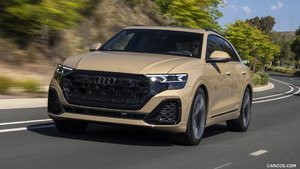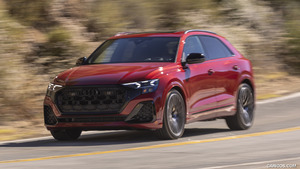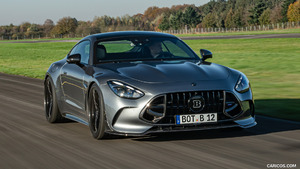Mercedes-Benz G 350 d
Powerful, comfortable, superior: The first vehicles of the new G-Class have been conquering the world's off-road trails since June. The cross-country vehicle convinces with performance, safety, modern assistance systems and excellent handling. The powertrain line-up is now being expanded with an efficient diesel variant. The new G 350 d (fuel consumption, combined: 9.8-9.6 l/100 km; combined CO2 emissions: 259-252 g/km)[1] boasts an output like never before. The models will be available to order starting in January 2019 and will arrive in dealerships in spring. As a result, the G-Class model range now offers buyers a choice between the G 500 (fuel consumption, combined: 12.1-11.5 l/100 km, combined CO2 emissions: 276-263 g/km), the AMG G 63 (fuel consumption, combined: 13.1 l/100 km, combined CO2 emissions: 299 g/km) and the new G 350 d.
The new OM 656 diesel engine will also set standards in the G-Class in terms of performance – both on and off the road. "Our goal was to increase the performance” while reducing the consumption and improving the noise characteristics at the same time", stresses Ola Källenius, responsible for Group Research and Mercedes-Benz Cars Development on the Daimler Board of Management.
The characteristics of the top-notch engine include the stepped-bowl combustion process, two-stage exhaust turbocharging as well as the use of CAMTRONIC variable valve timing. This heats up the exhaust system without driving up fuel consumption. The further advanced NANOSLIDE® cylinder wall coating also reduces friction losses in the piston/cylinder wall system and reduces fuel consumption.
As powerful and superior as never before
The new in-line six-cylinder diesel makes the icon the most efficient "G" so far. It produces an output of 210 kW (286 hp) and with a peak torque of 600 Newton metres between 1200 and 3200 rpm is as powerful as never before.
The new six-cylinder diesel engine is designed to comply with future emissions legislation (RDE – Real Driving Emissions). All components relevant for efficient emissions reduction are installed directly at the engine. This contributes to faster effectiveness of the catalytic converter and the diesel particulate filter. Thanks to the integral technology approach comprising the new stepped-bowl combustion process, dynamic multi-path exhaust gas recirculation and near-engine emission control system, further reduced consumption figures with low emissions are possible. Thanks to the near-engine insulated configuration, the emission control system has little heat loss and ideal operating conditions.
The most efficient G of all time
Thanks to further enhanced emission control technologies, the powerful six-cylinder unit from the modern OM 656 engine family remains below all of the emission limits of the current Euro 6d-TEMP standard even in demanding driving situations and environmental conditions. This is achieved with an additional selective catalytic reduction (SCR) converter with an ammonia slip catalyst (ASC) in the exhaust tract of the GLE. The SCR catalyst (Selective Catalytic Reduction) reduces the nitrogen oxides (NOx) in the exhaust gas. To this end, AdBlue®, an aqueous urea solution, is fed into the system. It chemically converts the nitrogen oxides in the exhaust gas, thus releasing ammonia, which reduces up to 80 percent of the nitrogen oxides into harmless nitrogen and water in the downstream SCR catalytic converter. The filler neck for the AdBlue® is integrated into the external tank recess of the vehicle, which makes straightforward filling at the fuel pump possible.
In ECO drive mode, the gliding function helps to save additional fuel. When the driver's foot leaves the accelerator pedal, the transmission's clutch disengages. This reduces the engine speed to idling level, and the driving resistance is reduced by the compression and frictional forces of the engine while coasting. The G-Class "glides", using its own, current kinetic energy for a certain distance. It rolls for a measurably longer distance than when coasting. This results in further fuel savings. The clutch is re-engaged as soon as the driver operates the accelerator or brake pedal.
Key data of the G 350 d at a glance:
| G 350 d | |
| Displacement | 2925 cc |
| Bore x stroke | 82.0 x 92.3 mm |
| Compression ratio | 15.5 ɛ |
| Engine and output | OM 656, 210 kW (286 hp) at 3400-4600 rpm |
| Peak torque | 600 Nm at 1200-3200 rpm |
| Fuel consumption, NEDC combined | 9.8-9.6 l/100 km |
| CO2 emissions | 259-252 g/km |
| Acceleration 0-100 km/h | 7.4 |
| Top speed | 199 km/h |
Comfort (too) at new heights
Partly due to the new quiet and harmonious diesel engine, the G-Class proves to be extremely comfortable, even on long distances. When driving, the exhaust system and the engine, which is also willing to rev at higher engine speeds, produce much less noise and vibrations in the interior. To reduce engine noise, the engine mounts of the diesel engine are actively controlled for the first time. At speeds below 5 km/h, they are set to soft to optimally dampen the transfer of torsional vibrations to the ladder-type frame at low engine speeds. At higher engine speeds, the two engine mounts are automatically made stiffer, which has positive effects on the vibrational comfort and the driving dynamics.
9G-TRONIC on board
For the transmission of power, the 9G‑TRONIC automatic transmission with torque converter was specifically adapted to meet the needs of the off-road icon. The developers used a dedicated software application to shorten the shift and response times of the 9-speed transmission and make the G-Class seem even more lively. The wide transmission ratio not only makes driving quieter and more comfortable especially at low engine speeds, it simultaneously also contributes to reducing fuel consumption. Especially in first gear, the off-roader responds to accelerator pedal commands noticeably better, which customers will appreciate especially when pulling away from a traffic light, for example. The "G" is now also significantly more agile during brief sprints under partial load.
The new transfer case is flange-mounted directly to the 9G-TRONIC. It is designed to send 40 percent of the drive torque to the front axle and 60 percent to the rear axle. This configuration particularly benefits the handling characteristics on the road. The permanent all-wheel drive ensures maximum traction. However, the "G" would not be a "G" if it did not have even more in store. The low-range off-road reduction gear considerably increases torque at the drive wheels, which e.g. makes very difficult terrain negotiable.
Personal best in terms of equipment features
The G 350 d is more extensively equipped as standard than the preceding model even ex-factory. This includes the high-quality interior with leather seats, an instrument panel covered in ARTICO man-made leather, and open-pore wood. There are also new options to tailor the G 350 d fully to personal preferences. In addition to various optional extras, Mercedes-Benz offers items from the very popular designo manufaktur ex-factory. For the first time ever, the Exclusive Interior Plus with diamond quilting is optionally available for the G 350 d.
As a result, the G 350 d is a seamless fit with the G-Class, which embodies craftsmanship and customisability like no other vehicle from Mercedes-Benz. In fact, the G-Class is almost exclusively built by hand, which results in a total production time of at least 100 hours. This underscores the uniqueness and high quality of every G-Class.
DYNAMIC SELECT is now available with up to five drive modes for the G-Class as standard. This allows adjusting the vehicle characteristics in seconds at the touch of a button, as the system modifies the characteristics of the engine, transmission, suspension, and steering at the driver's behest. In addition, the G-Class offers a host of new driver assistance systems. For example, Active Braking Assist is able to prevent impending collisions or mitigate their consequences, and assist the driver during emergency braking. If necessary, it will brake autonomously if the driver takes no action to defuse a detected dangerous situation.
Even better off the road, more dynamic than ever on the road
Specifically for the G-Class, the new front axle is designed in such a robust way that the off-road performance and off-road capabilities of its predecessor are retained and partly even surpassed. The components of the double-wishbone front suspension are directly mounted to the ladder-type frame without a subframe. The lower wishbone's attachment points on the frame in Z-direction are positioned as high up as possible. This arrangement ensures good driveability beyond the asphalt.
At the rear, in contrast to the predecessor, the new rigid axle is controlled by four trailing arms on each side and a Panhard rod. This makes normal driving on the road even more comfortable. Off the road, the rear spring jounce of 82 mm and rebound of 142 mm plus the ground clearance of 241 mm to the rear axle gear help to ensure a safe ride even in extreme situations.
Thanks to the new front-axle design, the on-road performance of the G-Class has been enhanced at the same time. On the road, the "G" is as agile as it is comfortable and provides the driver with a better steering feel. The off-roader stays on track more solidly, and is agile and effortless when driving off-road.
Stronger than time
The G-Class is the top model among luxury off-road vehicles. It is not only the passenger car model series with by far the longest production run in the history of Mercedes-Benz, but also the forefather of all SUVs bearing the three-pointed star – this is why all Mercedes off-road models feature the upper-case G in their name.
What began more than 40 years ago with a cooperation agreement between then Daimler-Benz AG and Steyr-Daimler-Puch in the Austrian city of Graz is now a story peppered with superlatives and milestones. At the time of its market launch, in the spring of 1979, it was available with a choice of four engine variants covering a performance range from of 53 kW/72 hp to 115 kW/156 hp. Customers had the option of a Cabriolet with a short wheelbase or Station Wagon models with short or long wheelbase. The consortium decided on the simple but distinctive name "G", standing for "Geländewagen" (off-road vehicle). At that time nobody could have guessed that this was an almost visionary decision in view of the later change in the nomenclature of Mercedes-Benz passenger cars classes, using just a single letter.
In 1989 the vehicles of the model series 463 marked the beginning of an evolutionary process for the off-roader that was not just about keeping pace with technical progress. It was an evolution that also brought a steadily expanding fan base and emphasised its character as an exclusive vehicle for any occasion. And, since 1993, a vehicle with an official name: the G-Class.
The summer of 2017 saw the 300,000th G-Class roll off the assembly line in Graz – a Mercedes-Benz G 500 in designo Mauritius blue metallic with black leather seats and contrasting white topstitching (fuel consumption, combined: 12.3 l/100 km; combined CO2 emissions: 289 g/km).
[1]The stated figures were determined in accordance with the prescribed measuring method. These are the NEDC CO2 figures pursuant to Art. 2 No. 1 Implementing Regulation (EU) 2017/1153. The fuel consumption figures were calculated based on these figures.
---In-Snow---Front-185453-120x90.jpg)
---In-Snow---Front-185453-1024x768.jpg) \n
\n---In-Snow---Rear-185454-120x90.jpg)
---In-Snow---Rear-185454-1024x768.jpg) \n
\n---In-Snow---Front-Three-Quarter-185455-120x90.jpg)
---In-Snow---Front-Three-Quarter-185455-1024x768.jpg) \n
\n---In-Snow---Front-Three-Quarter-185456-120x90.jpg)
---In-Snow---Front-Three-Quarter-185456-1024x768.jpg) \n
\n---In-Snow---Side-185457-120x90.jpg)
---In-Snow---Side-185457-1024x768.jpg) \n
\n---In-Snow---Rear-185458-120x90.jpg)
---In-Snow---Rear-185458-1024x768.jpg) \n
\n---In-Snow---Front-185459-120x90.jpg)
---In-Snow---Front-185459-1024x768.jpg) \n
\n---In-Snow---Front-Three-Quarter-185460-120x90.jpg)
---In-Snow---Front-Three-Quarter-185460-1024x768.jpg) \n
\n---In-Snow---Front-Three-Quarter-185461-120x90.jpg)
---In-Snow---Front-Three-Quarter-185461-1024x768.jpg) \n
\n---In-Snow---Front-Three-Quarter-185462-120x90.jpg)
---In-Snow---Front-Three-Quarter-185462-1024x768.jpg) \n
\n---Front-Three-Quarter-185463-120x90.jpg)
---Front-Three-Quarter-185463-1024x768.jpg) \n
\n---Front-185464-120x90.jpg)
---Front-185464-1024x768.jpg) \n
\n---Front-185465-120x90.jpg)
---Front-185465-1024x768.jpg) \n
\n---Front-185466-120x90.jpg)
---Front-185466-1024x768.jpg) \n
\n---Side-185467-120x90.jpg)
---Side-185467-1024x768.jpg) \n
\n---Front-185468-120x90.jpg)
---Front-185468-1024x768.jpg) \n
\n---Front-Three-Quarter-185469-120x90.jpg)
---Front-Three-Quarter-185469-1024x768.jpg) \n
\n---Front-Three-Quarter-185470-120x90.jpg)
---Front-Three-Quarter-185470-1024x768.jpg) \n
\n---Rear-Three-Quarter-185471-120x90.jpg)
---Rear-Three-Quarter-185471-1024x768.jpg) \n
\n---Front-Three-Quarter-185472-120x90.jpg)
---Front-Three-Quarter-185472-1024x768.jpg) \n
\n---Badge-185473-120x90.jpg)
---Badge-185473-1024x768.jpg) \n
\n---Interior-185474-120x90.jpg)
---Interior-185474-1024x768.jpg) \n
\n---Interior-185475-120x90.jpg)
---Interior-185475-1024x768.jpg) \n
\n---In-Snow---Front-Three-Quarter-185476-120x90.jpg)
---In-Snow---Front-Three-Quarter-185476-1024x768.jpg) \n
\n---In-Snow---Front-185477-120x90.jpg)
---In-Snow---Front-185477-1024x768.jpg) \n
\n---In-Snow---Front-185478-120x90.jpg)
---In-Snow---Front-185478-1024x768.jpg) \n
\n---In-Snow---Front-185479-120x90.jpg)
---In-Snow---Front-185479-1024x768.jpg) \n
\n---In-Snow---Front-Three-Quarter-185480-120x90.jpg)
---In-Snow---Front-Three-Quarter-185480-1024x768.jpg) \n
\n---In-Snow---Front-185481-120x90.jpg)
---In-Snow---Front-185481-1024x768.jpg) \n
\n---In-Snow---Side-185482-120x90.jpg)
---In-Snow---Side-185482-1024x768.jpg) \n
\n---In-Snow---Side-185483-120x90.jpg)
---In-Snow---Side-185483-1024x768.jpg) \n
\n---In-Snow---Side-185484-120x90.jpg)
---In-Snow---Side-185484-1024x768.jpg) \n
\n---In-Snow---Side-185485-120x90.jpg)
---In-Snow---Side-185485-1024x768.jpg) \n
\n---Front-Three-Quarter-185486-120x90.jpg)
---Front-Three-Quarter-185486-1024x768.jpg) \n
\n---Detail-185487-120x90.jpg)
---Detail-185487-1024x768.jpg) \n
\n---Front-Three-Quarter-185488-120x90.jpg)
---Front-Three-Quarter-185488-1024x768.jpg) \n
\n---Front-Three-Quarter-185489-120x90.jpg)
---Front-Three-Quarter-185489-1024x768.jpg) \n
\n---Front-Three-Quarter-185490-120x90.jpg)
---Front-Three-Quarter-185490-1024x768.jpg) \n
\n---Side-185491-120x90.jpg)
---Side-185491-1024x768.jpg) \n
\n---Side-185492-120x90.jpg)
---Side-185492-1024x768.jpg) \n
\n---Front-185493-120x90.jpg)
---Front-185493-1024x768.jpg) \n
\n---Front-185494-120x90.jpg)
---Front-185494-1024x768.jpg) \n
\n---Front-185495-120x90.jpg)
---Front-185495-1024x768.jpg) \n
\n---Front-185496-120x90.jpg)
---Front-185496-1024x768.jpg) \n
\n---Side-185497-120x90.jpg)
---Side-185497-1024x768.jpg) \n
\n---Front-Three-Quarter-185498-120x90.jpg)
---Front-Three-Quarter-185498-1024x768.jpg) \n
\n---Front-Three-Quarter-185499-120x90.jpg)
---Front-Three-Quarter-185499-1024x768.jpg) \n
\n---Detail-185500-120x90.jpg)
---Detail-185500-1024x768.jpg) \n
\n---Badge-185501-120x90.jpg)
---Badge-185501-1024x768.jpg) \n
\n---Interior,-Seats-185502-120x90.jpg)
---Interior,-Seats-185502-1024x768.jpg) \n
\n---Interior,-Rear-Seats-185503-120x90.jpg)
---Interior,-Rear-Seats-185503-1024x768.jpg) \n
\n






